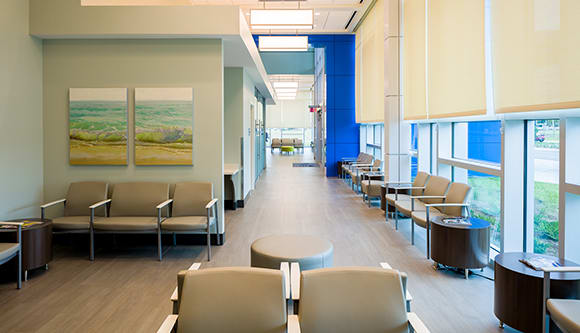Another health crisis?
Experts warn that putting off necessary emergency care for fear of COVID-19 infection is dangerous.
Article Author: Vikki Mioduszewski
Article Date:

As in cities and hospitals across the nation, local healthcare facilities experienced a significant decline in ER visits and hospitalizations in recent weeks. At a time when hospitals have been busy preparing for a COVID-19 surge, fewer people in healthcare facilities for non-coronavirus conditions may sound like a good thing. But one possible reason behind some of the decline in visits may actually be very bad for certain patients' health.
"Due to a fear of COVID-19 infection and a misconception that local Emergency Departments and hospitals are overwhelmed, some people are putting off care that should not be delayed," said emergency medicine physician Jeremy Wood, MD, with Emergency Resources Group and medical director of the Baptist Medical Center South Emergency Center. "We have seen fewer patients overall, but particularly concerning is the fact that there has been a dramatic decline in patients coming in with conditions such as heart attacks, sepsis (a life-threatening infection), strokes, and acute abdominal conditions such as appendicitis. It doesn't make sense that these medical situations are not happening so my worry is that patients are not coming in when they really need to."
Interventional cardiologist Salil Patel, MD with Baptist Heart Specialists is observing the same trend. "We are seeing fewer heart attack patients than we would expect," said Dr. Patel. "We have canceled elective cardiac catheterization cases, but our inpatient cardiac catheterization lab volume is markedly reduced. That is very unusual and we are concerned that people aren't seeking life-saving cardiac care when they need it most. Baptist Health has designated areas in our ERs and hospitals where patients with COVID-19 are isolated from patients with other conditions. ER doctors and hospital doctors evaluate patients and release them to go home as soon as possible to avoid potential exposure. It is safe to seek emergency care at Baptist Health."
While endovascular neurosurgeon Ricardo Hanel, MD, PhD, co-director of the Baptist Stroke and Cerebrovascular Center hasn't seen as much of a decline in stroke cases as his colleagues in other COVID-19 epicenters, he is concerned the downturn may worsen in coming days and what that could mean to local patients.
"We have already had a couple of patients with stroke symptoms decline medical treatment and leave against medical advice because of a fear of COVID-19 infection," said Dr. Hanel. "Stroke and aneurysms are very serious problems. We understand the fear caused by all of the massive communication about COVID-19 but the odds of having a life-altering medical outcome for not seeking proper medical care are far higher than the risk of getting COVID-19 in a healthcare setting."
Parents also avoiding ERs with potentially dire consequences
Anthony Pohlgeers, MD, chief of Pediatric Emergency Medicine for Wolfson Children's Hospital and medical director of Pediatric Emergency Medicine for Emergency Resources Group, said there are many reasons for fewer children’s ER visits and hospitalizations in the wake of COVID-19.
“First, most likely, is the success of social distancing and quarantine. This policy has kept children out of day cares and schools right in the midst of respiratory disease season, thus limiting their exposure to those diseases and to illness,” Dr. Pohlgeers explained. “Combine this with the lack of sports competition and this, in turn, limits the sports injuries we see. Third, and most concerning: parents are deferring and/or delaying visits to the ER for reasons that, in the past, would have prompted a visit. They are doing this because of the fear of exposure to and of contracting COVID-19.”
While there have been confirmed cases of COVID-19 in children and teens in our area, they make up only a small percentage of the total cases. “When children do get COVID-19, for the most part, they are spared the severity of illness like that seen in adults,” Dr. Pohlgeers said. “As a result, many do not even seek medical care. What this means is that there are some children suffering from other serious illnesses that will become problematic if they do not seek care in an Emergency Department.”
Dr. Pohlgeers and his Wolfson Children’s Emergency Center colleagues are already seeing kids coming in with non-COVID-19 medical conditions who are sicker than usual, even during flu season.
“We’re learning from multiple children’s hospitals in Italy, who are about three weeks ahead of us in their social restrictions, that they’re seeing parents delay bringing their children for illnesses and trauma, resulting in worse outcomes than expected. They have had children come to their hospitals with diagnoses of appendicitis, new-onset diabetes, and other serious illnesses because parents have waited days after symptom development and now these children are experiencing preventable prolonged hospitalization, complications and sometimes worse.
“In our own Emergency Departments, we are seeing increased percentages of children requiring hospital admission, above what would have been expected with decreased ER volumes. This suggests that delay in seeking care is resulting in otherwise preventable hospitalizations and complications, much like the Italian experience.”
Heed warning signs
Dr. Patel said symptoms of a heart attack, a medical emergency, should not be ignored. They may include:
- Chest discomfort. “It can be chest pressure, heaviness or tightness that can sometimes feel like something sitting on your chest,” Dr. Patel explained.
- Pain or discomfort in one or both arms, the back, neck, jaw or stomach
- Shortness of breath, with or without chest discomfort
- Breaking out into a cold sweat, nausea, vomiting or lightheadedness
"Heart disease is still the No. 1 killer in the world, even with the COVID-19 pandemic," said Dr. Patel "Although it is appropriate to try to avoid exposure to COVID-19, Baptist Health is prepared to safely evaluate and treat patients who come in for cardiac issues. The alternative may be that people may die at home or suffer more significant events due to a heart attack not being treated appropriately in a timely fashion."
Likewise, there are some signs of stroke to be on the lookout for. Dr. Hanel recommends people remember the acronym, BE FAST:
B - Balance: Is there a sudden loss of balance or coordination?
E - Eyes: Is there sudden vision loss, persistent blurred vision and/or sudden trouble seeing?
F - Face: Ask the person to smile. Does one side of the face droop?
A - Arms: Ask the person to raise both arms. Does one arm drift downward?
S - Speech: Ask the person to repeat a simple phrase. Is their speech slurred, strange, or are they unable to speak?
T - Time: If you observe any of these signs call 911 immediately.
“If you have any symptoms of a stroke or sudden onset of headache, you should seek emergency medical care,” Dr. Hanel added. “Please don’t play down these symptoms. This could be the difference between life and death or a life with a disability. The faster you seek care, the better your chances for treatment and recovery.”
Don’t delay in an emergency
If you’re a parent, how do you know if your child’s symptoms warrant a call to the pediatrician or an ER visit? “Parents have great instincts so trust your gut,” said Dr. Pohlgeers. “If you think your child may be experiencing a medical emergency, call your child’s pediatrician, bring your child to the ER or call 911. Wolfson Children’s Emergency Centers are here for your children 24 hours a day 7 days a week. We go to extremes to make sure that our ERs are safe to visit through prescreening and screening at the door.”
Dr. Wood said, “People need to know that Baptist Health and all of our Emergency Centers are willing, ready and able to see them in a safe manner and that we have the capability to care for them without exposing them to risk of infection with the processes we have had and continue to have in place.”
At Baptist Health, we want to help keep our community informed about COVID-19. For more information, visit baptistjax.com/covid19 or wolfsonchildrens.com/covid19.
Baptist Health physicians are here for you during this time and can diagnose, treat and prescribe medications virtually. Request an online doctor appointment here.



